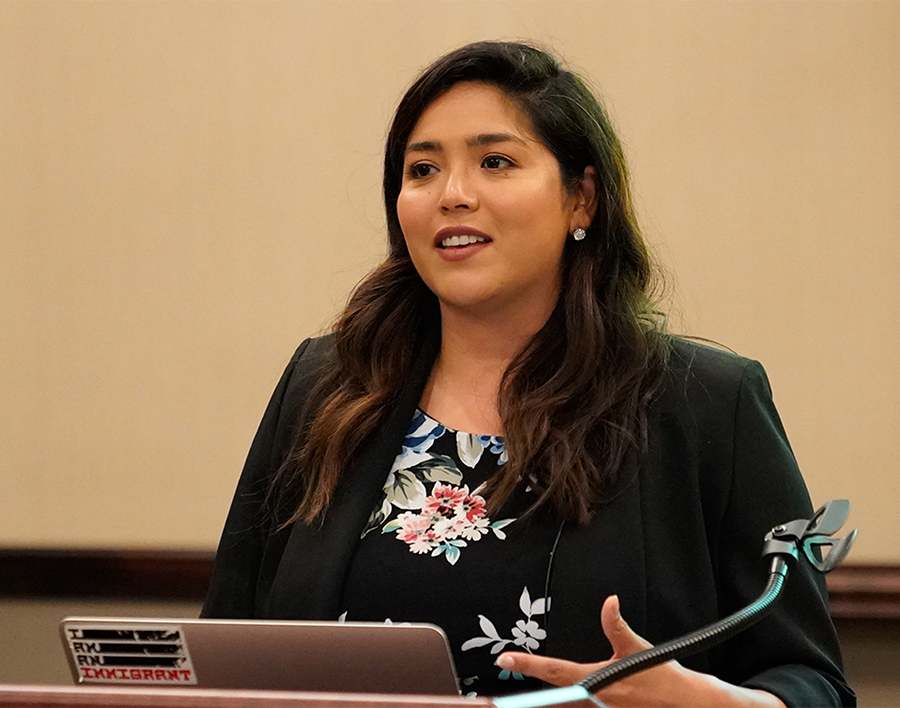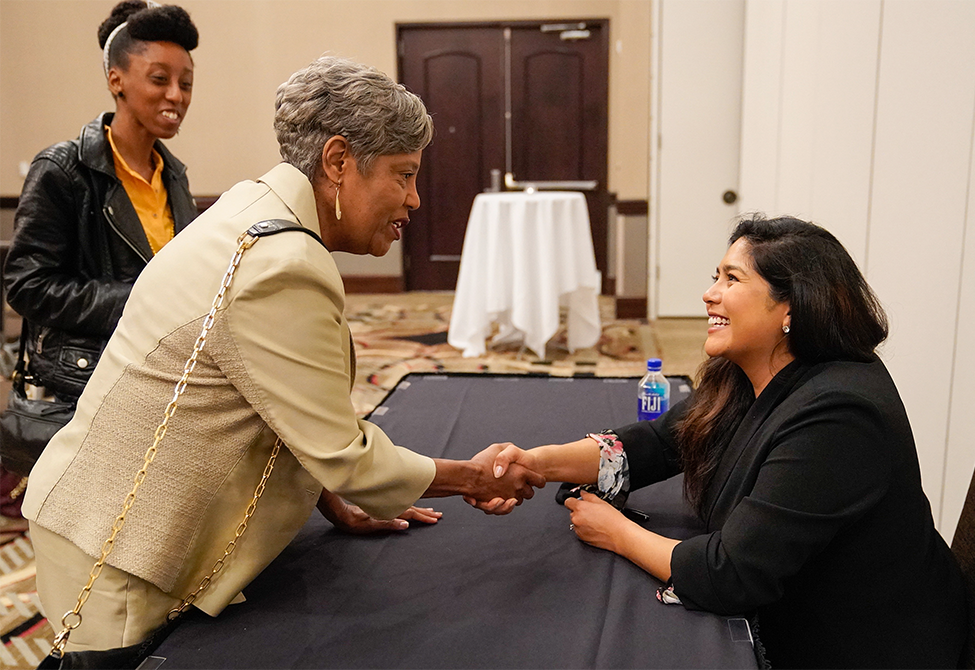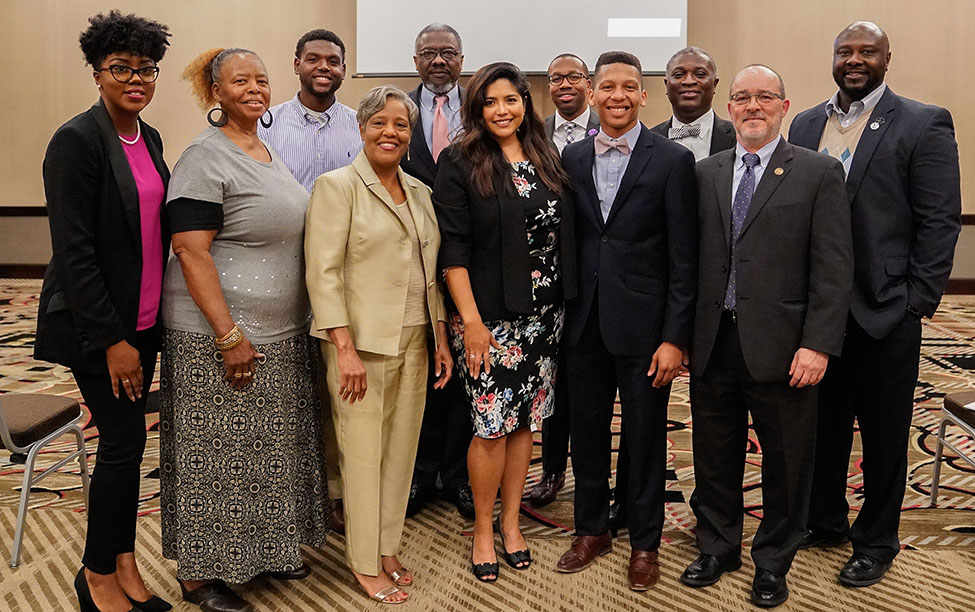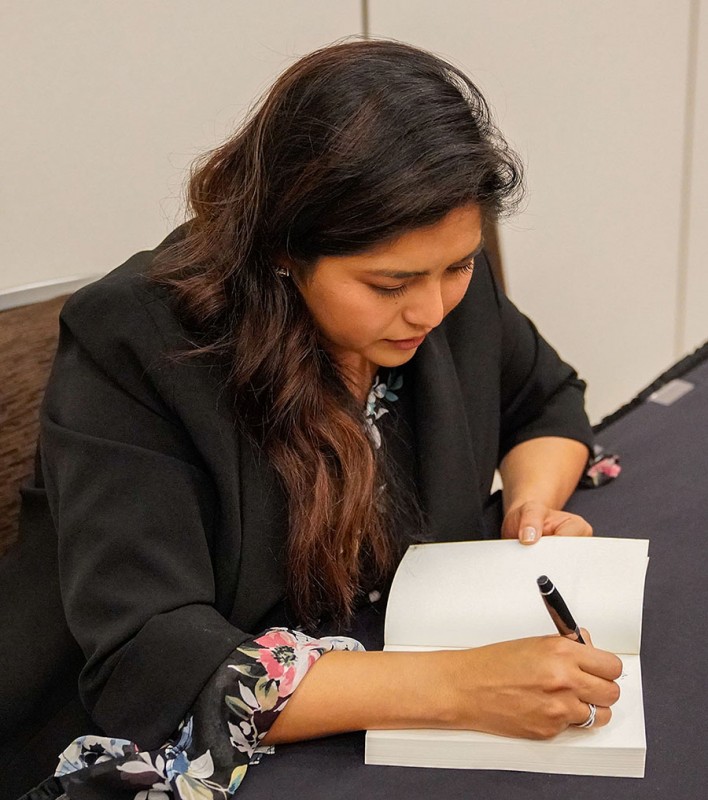



Author: Kirsten J. Barnes | CCBP Contributor
The Tuscaloosa community gathered at the Embassy Suites Hotel Ballroom on March 27 to engage in dialogue with Julissa Arce, advocate for immigrant rights and education and author of “My (Underground) American Dream.”
The event was part of the Realizing the Dream Distinguished Lecture Series, which celebrates the Legacy of Dr. Martin Luther King Jr. Hosts for the event are Stillman College, Shelton State Community College, the Tuscaloosa Southern Christian Leadership Conference, and The University of Alabama.
For Arce, her American Dream began at the age of 11 when she accompanied her parents to the United States by plane from Mexico. They had work visas, but when her visa expired she became undocumented and remained so for the next 15 years.
“If you turn on the news you will hear about immigration every day. You will hear about border security and that in order to have border security we have to build a wall,” Arce told the audience of about 100. “Well I came here on a plane, and so I often think about how high this wall would have to be.”
Arce explained that 40 percent of undocumenteds in the United States never crossed the Mexico-United States border or any border illegally, but came here on a visa that later expired. She realized she was undocumented when she was 14 and anticipating returning to Mexico to celebrate her 15thbirthday with a Quinceañera, which in Latin culture marks the transition from childhood to womanhood with a lavish celebration similar to a wedding.
“My mother told me I couldn’t go to Mexico anymore, because my visa had expired and if I went to Mexico I couldn’t come back,” said Arce, who at the time did not understand the full implications of what it meant to be undocumented. “I went to sleep crying because I wasn’t going to have a party.”
For the next several years she learned to hide and live in the shadows of her parents, who had valid visas, and her little brother, who is a U.S. citizen. Still, she completely bought into the American Dream by working and studying hard and staying out of trouble.
In Texas in high school she excelled academically and athletically, but had few college options because with no social security number, she could not qualify. However, Texas passed a law allowing undocumented residents to attend college and qualify for state financial aid.
At 18 Arce thought, “If I could get my hands on enough financial resources I could become an American.” However, she soon realized that money was not the answer. Citizenship is only open to highly skilled workers, children of parents who are citizens, and spouses of Americans. There was no fee she could pay and no line she could stand in to become a citizen.
Yet, the finance major was undeterred and determined to work on Wall Street, and the summer after her junior year, she was accepted as an intern at Goldman Sachs and 10 weeks later offered a full-time job.
“However, after the initial excitement, the reality set in that it didn’t matter how hard I worked, I was still undocumented. The only choice that I could make was to buy a fake green card and a fake social security card,” she said. “I don’t say this as a source of pride, because I wish every day that I didn’t have to do that. It would have been so much easier to fill out an application, pay a fine and get my papers the right way.”
Every day for the next several years, she was constantly looking over her shoulder. When her father, who had moved back to Mexico, became ill and died, she could not go to Mexico to see him or attend his funeral, which led her to finally confide in her boyfriend that she was undocumented.
“A few weeks after I told him this, we were sitting in my apartment and he said, ‘Why don’t we get married?’ Don’t propose to your significant other that way,” she said. “It changed my life, but it still took five years and $20,000. We had resources and we were able to hire lawyers who could walk us through the case. However, many people who hire lawyers are defrauded.”
She said after beginning her journey to become a citizen, she realized she needed to do more to help others who were undocumented, which led her to found the Ascend Educational Fund to help other young people in similar circumstances.
“My story has a really great ending. I’m standing before you today. My book has become a Washington Post bestseller and is currently being developed into a television series with America Ferrera” (an American actress and director born in Los Angeles to Honduran parents), Arce said. “That is an amazing ending to this journey that I have been on, but there are still millions of people who are walking in the shoes I walked in for so long and their stories are not any different than mine. They work hard and they stay out of trouble.”
She said anti-immigrant rhetoric has caused people to think of undocumented immigrants as criminals, but that is not the case for the majority of people who come here searching for a better life and their own American Dream.
People tell her all that time she should have been in jail for lack of documentation, she said. “Things could have turned out a different way. Life is not straightforward and people are faced with very difficult choices and decisions.”
After the speech there was a question and answer session and a book signing.
“I am a moderator for a Sustained Dialogue class and I had never had a conversation about immigration,” said Beau Devaul, a senior at UA majoring in finance and economics, who said he was inspired by Arce’s story. “When I think about Dr. King he was about equality for all and I was happy to see that the series is inclusive of everybody.”
Dr. Samory Pruitt, UA’s vice president of community affairs, has been a part of the series since its inception. “I give the committee a lot of credit. They look at the theme we have and try to make sure the speakers enlighten our community on a wide array of social justice themes, not just black and white issues,” Pruitt said.
Marcelle Peters, a UA senior who is president of the University’s National Association of Hispanic Journalists and vice president of the Hispanic-Latino Association, said she first saw Arce on CNN discussing her book. “I though her American dream was particularly inspiring and suggested to the committee we bring her here,” said Peters, a second-generation Mexican-American citizen who will be the first in her family to graduate from college. “When I saw she had written a book and was an executive at Goldman Sachs, I thought we definitely need her to come and speak.”
“I worked with immigration with U.S. Sen. Richard Shelby’s office for years,” said Melissia Davis, a Stillman alumna and current member of its Board of Trustees. People looking for that American Dream still have to overcome difficult obstacles, she said.